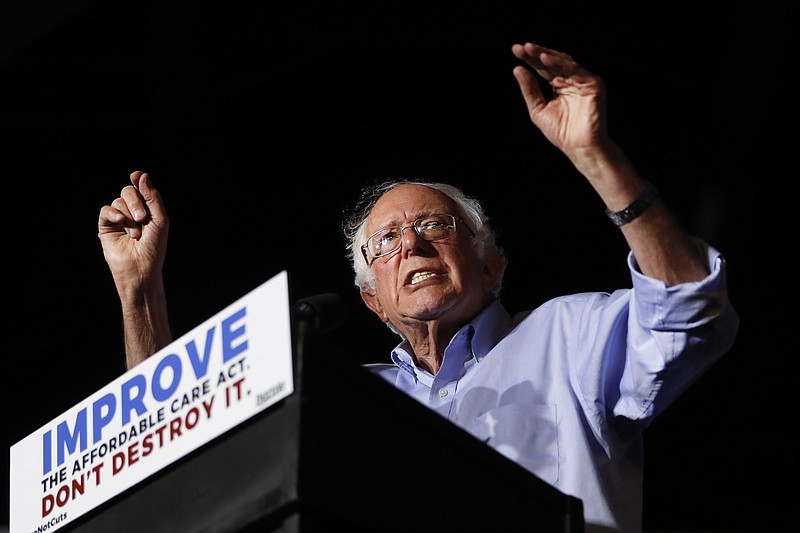WASHINGTON - For years Democrats have hammered Republicans for spouting empty slogans and magic math.
Tax cuts will pay for themselves? Uh-huh, if you say so. Maybe have a chat with Kansas.
Build a wall, and Mexico will pay for it? Hmm, that's not what Mexico says.
Repeal and replace Obamacare? Right-o, show us a replacement plan - any replacement plan, that won't raise rates and cause millions of Americans to lose their insurance.
Democrats have for a little while enjoyed a virtual monopoly on evidence and experts.
But the lesson the Democrats seem to have taken from the 2016 electoral trouncing is that they need to become more like Republicans. Meaning: Abandon thoughtful, detail-oriented bean-counting and attempts to come up with workable solutions grounded in (occasionally unpopular) reality, and instead chant virtue-signaling catchphrases.
Such as "single-payer."
On Wednesday, Vermont Sen. Bernie Sanders unveiled his latest iteration of "Medicare for All." Unlike the last time he introduced such legislation, in 2013, this bill had 16 co-sponsors - a third of the Democratic caucus. Among those co-sponsors were many potential contenders for the 2020 Democratic presidential nomination, such as Sens. Kirsten Gillibrand of New York, Kamala D. Harris of California, Elizabeth Warren of Massachusetts and Cory Booker of New Jersey.
In a sense, they had to sign on. Single-payer is rapidly evolving into a litmus test for Democrats wishing to prove themselves sufficiently progressive for their leftward-shifting party's base.
Even as Republicans attempt to rip health insurance away from millions, single-payer has become astonishingly popular - among the public generally and Democrats in particular. A June Pew Research Center survey found that a slim majority of Democrats say health insurance should be provided through a single national insurance system run by the government. Among Democrats under 30, the share was two-thirds.
We live in our patchwork world, which means if we want single-payer - an ill-defined catchall, by the way - we need to figure out how to get from here to there. This involves painful political choices, sharp tax hikes and some degree of buy-in from the many stakeholders who are going to get shafted in the transition.
What about the 178 million people who currently have employer-sponsored health insurance and overwhelmingly like it? What about the sticker shock awaiting individuals and employers over the tax increases necessary to pay for such a program? What happens if hospitals go bankrupt because Medicare reimburses at much lower rates than private insurance? Would the government step in and run them, as is the case in Britain?
And most important, how do you actually pay for this enormous, multi-trillion-dollar overhaul? Given Americans' allergy to higher taxes, it's not enough to dismiss fiscal concerns by assuming Americans will gladly give Uncle Sam the money they currently earmark for a private health insurance system. On this and other major questions, the Sanders plan punts. Anyone who asks such questions, or raises an eyebrow at the lowball estimates cooked up by the Sanders camp, gets branded a wet blanket, a heartless technocrat, a corporate shill or worse. The goal should be universal health care, however we get there. And we're much likelier to get there if we start from a baseline of reality than if both parties hand-wave away inconvenient truths. There is no courage in saying everyone should have health care. The courage is in staking out a plan to pay for it.
One of the things about representative democracy is that you need the people's representatives to actually work out the details. On this aim, both parties are barreling toward failure. Democrats learned in 2016 that they needed a message and not just a slate of policies; now with unified government power, Republicans are learning in 2017 that they need a slate of fleshed-out policies and not just a catchy message.
Washington Post Writers Group
